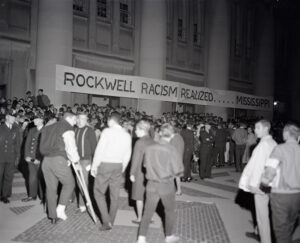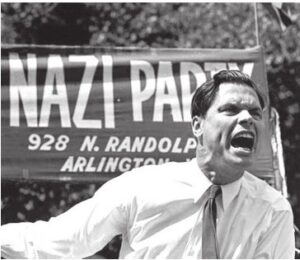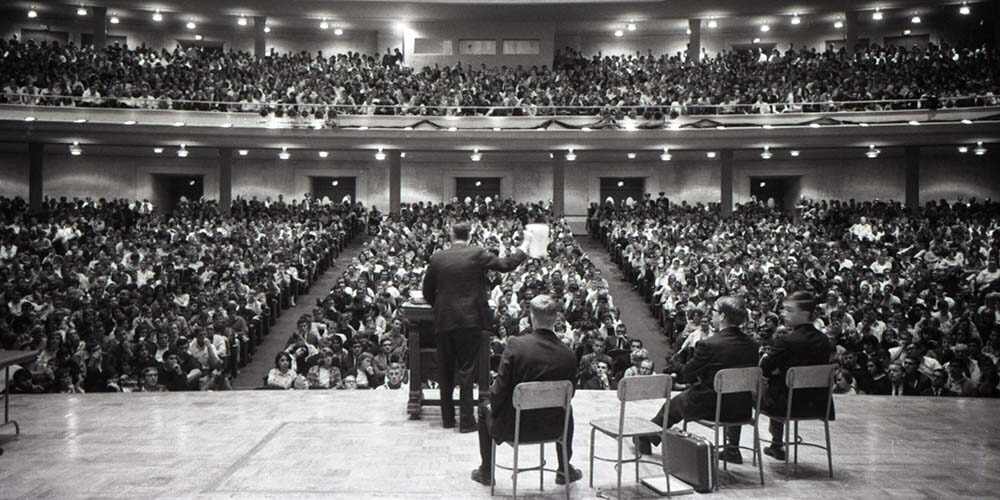An unwelcome announcement
The fall semester of 1964 had barely begun when a small advertisement appeared on a page inside the Michigan Daily. It said:
“U. of M. Union wishes to announce the appearance of Cmdr. George Lincoln Rockwell on Campus in October.”
The Union, not to be confused with the building of the same name, was the student organization that sponsored many of the school year’s major public events. Its operations were largely independent of the administration and the faculty. Its student officers chose the speakers, organized the concerts, booked the venues, and sold the tickets.

Protesters strung a banner across Hill’s facade that equated Rockwell with Jim Crow rule in the American south. (Image: U-M’s Bentley Historical Library)
Many readers of the Daily may not have recognized this guest’s name. But Lloyd Graff did. He was a student who occasionally wrote for the Daily. In a brief editorial, Graff said he had experienced the announcement as “a piece of shrapnel boring into my spine.”
“How can a student organization dignify Rockwell, an avowed Nazi, with an invitation to appear on campus? This is a man whose symbol is the twisted cross of Hitler. He shouts his adherence to the hideous Nazi creed.”
Graff had it right. Before the term “neo-Nazi” became familiar, George Lincoln Rockwell was the prototype. Tall and handsome, a glib and effective speaker, Rockwell had been inciting attention as the self-declared leader of the “American Nazi Party” since the late 1950s.
Graff conceded that the First Amendment protected Rockwell’s right to speak — somewhere. But on the stage of Hill Auditorium? “Should he be allowed to use a University facility to shout his diatribe?”
His question set off a debate that lasted several weeks. In a time before the internet and social media, the discussion played out largely on the editorial page of the Daily, and in language far more civil than is customary in today’s public controversies.
Long before free-speech debates consumed campuses in the 21st century, the contest over George Lincoln Rockwell’s appearance at Michigan became a classic battle in microcosm over the proper role of the First Amendment on a college campus, even about the mission and purpose of a university.
A monster up close
On the day of Graff’s protest, the Daily’s pages carried the customary news and notices of a pleasant fall. The Wolverines were preparing for their home opener against Air Force. Cinema Guild was urging students to attend Thursday and Sunday movie nights because Friday and Saturday crowds always overflowed. The Beatles’ A Hard Day’s Night was playing a long run at the State Theatre.But it was also a time of jitters and fear. It was not yet a year since the assassination of John F. Kennedy. A coup d’état had just unseated the government of South Vietnam. Students at the University of California, Berkeley, protesting a university ban on all political activities on campus — even invitations to outside speakers — had battled with police.

Long before free-speech debates consumed campuses in the 21st century, the contest over George Lincoln Rockwell’s appearance at Michigan became a classic battle in microcosm over the proper role of the First Amendment on a college campus, even about the mission and purpose of a university. This is Rockwell in full-outrage mode. (Image: Lansing City Pulse.)
Race and racism dominated the headlines. Southern whites appalled by the passage of the federal Civil Rights Act, which had been strongly supported by President Lyndon Johnson, were backing the presidential candidacy of Gov. George Wallace of Alabama, an avowed segregationist. The nonviolent strategy of the Rev. Martin Luther King Jr. had paid dividends, but younger Black leaders were calling for more confrontational tactics in the struggle for equality.
Sen. Joseph McCarthy was dead, but the fear of Communism persisted, fueling the rise of Republican Sen. Barry Goldwater of Arizona, the most conservative presidential nominee in memory, whose campaign was entangled with the far-right John Birch Society.
In short, the country was in a state of unrest that demagogues like George Lincoln Rockwell dream of.
World War II was not even 20 years gone. It lay square in the middle of living memory for most faculty and staff. Undergraduates of 1964 were too young to remember it, but they had grown up in the war’s shadow. In the wake of Israel’s 1961 trial of Adolf Eichmann, a key organizer in Adolf Hitler’s effort to exterminate European Jewry, Americans were coming to a deeper understanding of the Holocaust.
So for many students, the Union’s invitation to an American who called himself a Nazi offered a chance to observe a monster in the flesh. The organizers would have no trouble filling Hill Auditorium.
… Continue reading at the University of Michigan Heritage Project. The story picks up at Chapter 3, “The American Nazi.” Feel free to return here when you are finished reading to comment below.
In the lead image from U-M’s Bentley Historical Library, Rockwell speaks from the podium in Hill Auditorium.




Don Peterson - 1973
At least he was able to make the speech. I doubt that now he would be able to do that, and I believe that is sad.
Reply
Joseph Burak - 1998
‘If we extend unlimited tolerance even to those who are intolerant, if we are not prepared to defend a tolerant society against the onslaught of the intolerant, then the tolerant will be destroyed and tolerance with them’. – Karl Popper on the paradox of tolerance
I’m glad we curb hate speech and false news. In fact, we have a moral obligation to do so.
Reply
Carl Carlson - 1966
The problem, Joseph, is the arbiter of hate speech. In the example (Rockwell 1963) it is obvious and crystal clear. Today, much of what is labeled hate speech is speech that is politically disagreeable. When disagreeable speech is excluded from the public square by people who disagree, there is no opportunity to hear opposing views and engage in dialog that is essential to forming rational opinions and learning how to think for oneself. Universities should value and seek out differing and disagreeable speech, as part of the learning process. To use the analogy of a pendulum, the pendulum has swung too far to one side, and we all need to be more tolerant of and willing to hear opposing and disagreeable views. When we focus only on extreme examples like Rockwell 1963, we miss this crucial point.
Reply
Mike Jefferson - 1979
Carl, I think you highlight a generational disconnect between people like yourself who were raised on American principles and values and those embraced by Joseph. Younger people lack critical thinking skills and instead are fed a diet of social justice (read marxist) pablum. This “group think” which in reality mirrors the approach embraced by the “Spirit Warriors” in Japan, N-zis in Germany, and the communist party in China is highly injurious to the American Experiment and freedom in general. The University of Michigan is an instrument of “woke warriors” who are highly intolerant of and threatened by dissenting views and therefore resembles in many ways the aforementioned groups than a true university. Ironically, people like Joseph and the university itself is completely ignorant of their own intolerance and epitomize the observations of the great and late defender of freedom, Winston Churchill who observed, “Everyone is in favor of free speech. Hardly a day passes without its being extolled, but some people’s idea of it is that they are free to say what they like, but if anyone else says anything back, that is an outrage.” We live in an era of marxist outrage encouraged and promoted by our political institutions and universities.
Reply
Ura Big-Ot - 2011
Mike, does the term Woke keep you up at night? Let me cry a single tear for you.
Reply
Dr. Diane Greene - 1967
I was a freshman in 1963. I think my English professor, Dr. Eastman,May have told the class about Rockwell’s visit.
I recall a lot of student protest on campus prior to the event. There were yellow bands with Jewish stars on them wrapped around trees, reminding us that Hews in Germany had to identify themselves.
And so the audience waited, so sure we would put this Nazi bigot in his place.
He marched up to the stage, in full Nazi gear.
And he began: “The Jews…”
But he was IMMEDIATELY drowned out by the boos and hissing of the audience.
He tried again: “The (n-word)”, and again, boos and hissing shut him up.
Ah, but this Nazi knew just where to go next:
“You know, the QUEERS had a convention in Atlanta last week…”
Silence in the audience.
“And you couldn’t buy Vaseline for miles…”
Silence… Then, the unthinkable: laughter. The audience was laughing with the Nazi.
Encouraged, Rockwell continued, and a couple of moments later said, “ and we should line every last one of them up and shoot them.”
No protest. Because it was 1963, and no one dared to stand up, because someone might think YOU were a queer. In a couple of minutes, at a liberal American university, this Nazi had proposed a final solution for homosexuals.
Because a bigot can always find a target that no one will protect.
I felt sick, stood up and walked out.
I was 18, had just fallen in love with a girl that summer, and she with me.
I couldn’t even tell my wonderfully loving mother, let alone ANYONE at Michigan.
And I had just experienced the utter lack of protection that surrounded me.
I wrote of this experience last year in my Truro Memoir group. ( I live in Wellfkeet, MA.)
Obviously, it was an indelible experience.
I’m grateful for this chance to share it with all of you.
Diane M. Greene, Ph.D.
Class of ‘67
Reply
Deborah Holdship
Thank you for sharing that story.
Reply
Lisa Khan - 1994
I’d like to think the audience would react very differently today.
Reply
Mike Jefferson - 1979
That’s the problem. Toads like Rockwell, Fara-con, Waters, Peelosi, et al should be allowed to speak but their failed ideas challenged. The modern day left is afraid of debate instead embracing marxist violence and intimidation. Your comments demonstrate which side of the fence you align with.
Reply
Steven Hicks - 1989
While I am sure that there were many — probably too many to count — instances were no one stood up to homophobia in your presence, your recollection of this speech is not consistent with the author’s account (if anyone bothers to read it) or the audio file of the speech. In fact, the photo at the top of this article shows the speaker, an avowed Nazi, to be dressed “conservatively” as the author stated in his article and not as you said “in full Nazi gear”. That being said, I am sure that he wore that get-up on many occasions and chose not to do so for this speech purposefully so that he could act as if he were presenting ideas worthy of discussion. See David Duke and his similar conservative presentation when he ran for political office and thankfully did not succeed. I am conflicted about how to handle such requests to speak on campus and I recognize that the danger has only expanded with social media but I ultimately end up favoring free speech over censorship. But, I do question why he was allowed to speak at Hill Auditorium. With historical accounts, it is important to be accurate about what happened. Fortunately, the author of the article appears to have provided an accurate accounting of this important event based on the audio.
Reply
Vernon Polidoro (Polidor at the time) - 1967
I see what you did there… some nut case 50 years after Rockwell’s death spoke about just the new beginning of the “white racialist” movement, not “white supremacist.”
You could have easily made the connection with the Ku Klux Klan that was alive and well through much of that period. But the media have buried that reference and much prefer “white supremacist.” I wonder why?
Reply
Norman Miller - 1965 &1966
I was there! My recollections–1. He dressed conservatively–no Nazi uniform. 2. He started off by commenting that we should hurt Castro by dropping plenty of counterfeit Cuban money on the island–a comment that went over reasonably well with the audience. 3. The audience contained a large percentage of Blacks and Jews–not a sympathetic group. When he started to berate Jews by claiming they owned this and that, someone shouted “Yeah–we got ’em all”!!–and the audience erupted in laughter and applause. I rather doubt that he picked up any converts for his cause.
Reply
Mike Jefferson - 1979
Truth rather than revisionist history. How refreshing.
Reply
Andrew Paterson - 1966
You are correct in your observation. I too attended with about two dozen Sigs and Sammies in the balcony together just for our interest in seeing a “crazy” American Nazi. . Rockwell spoke out saying the C.E.O.s of ABC, NBC and CBS were all Jews. I think it was Harvey W., that immediately stood up and yelled: “WE GOT ALL THREE!!”. And you are correct everyone laughed loudly and applauded.
Comedy is 1st amendment speech that can work well against narrow minds, bigots’ and fools. It’s a shame it is used too little today.
Reply
James Percich - 1967
The urge is to try to silence those who are engaged in hate speech and the “big lies”. But, to do so may place them and their causes on a platform of being the victim instead of the perpetrator of misinformation and hate.
This period in is truly a test of our open and free society. Do we have the courage and strength to protect the freedom, and rights of all? Each of us must become actively involved in our democracy, if not, it will be lost.
Reply
Paul Kirby - 1967
All of the previous commentators have made interesting points. While I was a UM student at the time, I did not attend this speech. All “sides” to any discussion can become intolerant of other views. Finding the dividing line between troubling disagreement and hate speech can be difficult; there seems to be a large gray area. I would not welcome the task of deciding who does and does not get to give guest speeches at UM. But I do think that the best ways to handle disagreeable and/or hate speech are: (1) Don’t attend such a speech. If the speaker finds the audience to be sparse or nonexistent, THAT sends a message, or (2) Attend the speech, remain silent, and leave in silence. Silence would also send a much more powerful message than hissing and booing, which is likely what the speaker expects, and what will most likely feed his/her/their intolerance.
Reply
Tim Bartholow - 1973, 1974, 1979
I did not see this speech at Hill, still being in high school in Ohio in 1964, but I have heard Rockwell speak to another college audience, perhaps around this same time. Maybe he was “on a roll” for college and university speaking engagements about that time? I went to hear him speak at Muskingum College in New Concord, OH, nine miles from my hometown, when I was either in high school or maybe home early one spring as an undergrad thanks to Michigan’s trimester system. In any event, I do not recall him snarling as the picture shows, a grimace captured by a certain recent President, but I do remember that he was roundly laughed at by the audience for his absurd pronouncements. That showed me that there will always be good people in the world; there just needs to be MORE of them sometimes!
Reply
Ron Grabois - 1964
I had graduated in the spring of 1964 so do not recall this event. Some of you however may recall in 1961 or 1962 the visit of the governor of Mississippi, Ross Barnett. Came to Ann Arbor to talk about the advantages of segregation. I was not able to attend but vividly remember the outcry when he came to campus. He did speak But do not recall what he said and what the student reaction was to him.
Reply
Gary Barber - 1968
Yes, I was there too. I don’t remember much of the actual speech, but the thing I do remember was that he was allowed to speak. The audience was not sympatric, but they did not engage in disruptive behavior that tried to prevent his speaking. Unlike today when even mildly provocative speakers are “deplatformed” and physically prevented from appearing.
U of M and most of academia has lost its purpose of educating and instead bows down to whichever group is loudest in venting its grievances.
Reply
Brian Kott - 1967
I was on the Union committee that organized the speech. It was a part of the speaker series that brought five or six political speakers to campus that academic year. That included Ross Barnett, Richard Daly (Mayor of Chicago), and Rockwell. As I recall Barnett was laughed out of the room (figuratively). Based on that experience, I concluded that, although everyone has a right to speak, we did not necessarily have to give them a platform. So at least, for me, the program was an educational experience, which is the purpose of the University.
Reply